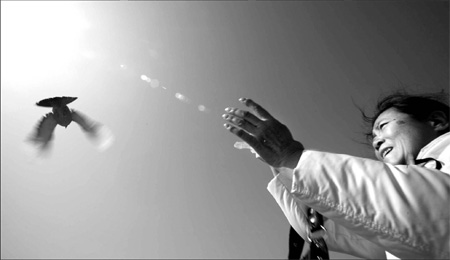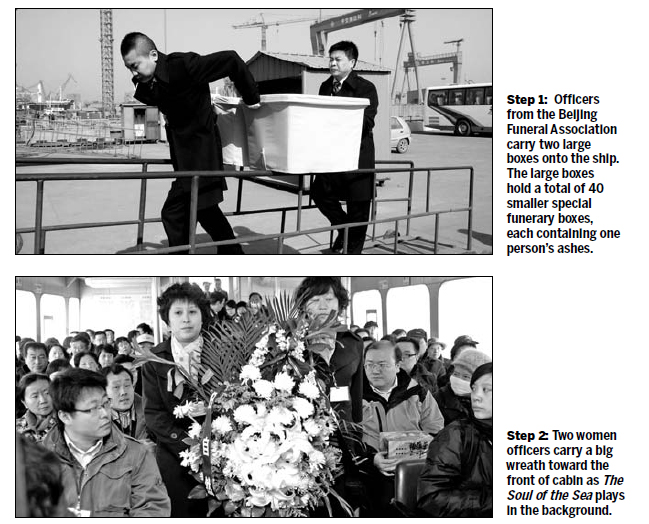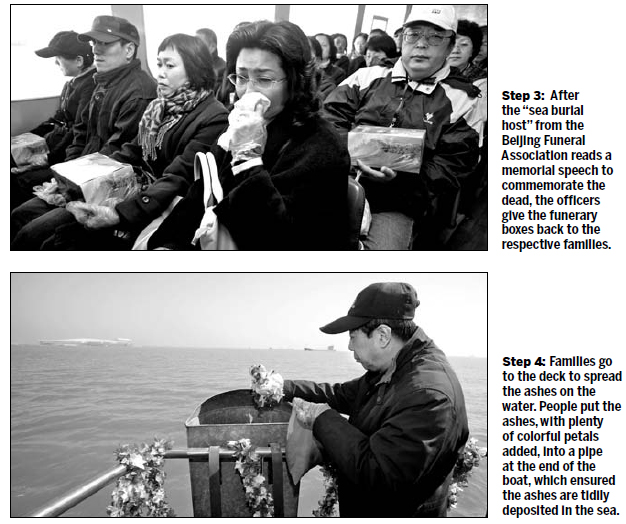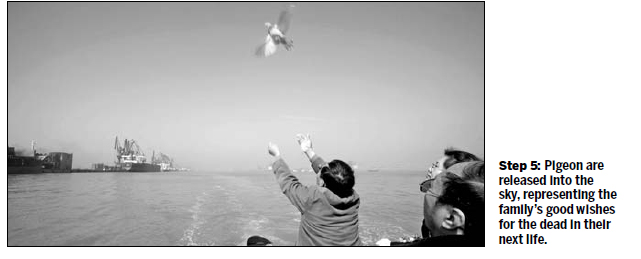Focus
Goodbye on the waves: a sea burial
By Zhao Yanrong (China Daily)
Updated: 2010-04-02 06:38
 |
Large Medium Small |

A chronological look at how a typical sea burial works, Zhao Yanrong reports
As thousands of Beijing citizens prepare to visit Babaoshan Cemetery during the upcoming Tomb Sweeping festival, a group of families recently went to the Bohai Sea to bury their loved ones. Such sea burials are gaining popularity among Beijingers.
5:00am: In the Tiantongyuan area of Beijing
It was still windy and dark outside. But Yu Lianjie was ready to meet her two elder sisters so they could spread their parents' ashes on the Baohai Sea in Tianjin.
Although Yu's mother passed away 19 years ago, the 46-year-old still couldn't hold back her tears. The sisters held off on the burial ceremony until their father also died in late 2009, so that their parents could be buried together.
She had bought two bunches of chrysanthemum for today's ceremony.
"My mom loved all beautiful things, but she loved flowers most," Yu said.
6:00am: In front of the Military Museum
Chang'an Street was getting busier as daybreak neared. But before the first rays of sunshine touched the sidewalks, the capital was still cold.
The three sisters waited in line for the buses. They didn't talk much, unlike most of the other families heading to the sea burial.
There were almost a hundred Beijingers in total going on the trip, almost all holding fresh flowers or carrying fresh petals. An old woman having trouble clutching a big bunch of red roses declined help and insisted on holding them herself.
9:30am: At Tanggu Wharf, Tianjin
The Bohai Sea reflected the bright sun as water birds twittered across the wharf.
Officers from the Beijing Funeral Association carried two large boxes to the Haiyi. The large boxes held a total of 40 smaller special funerary boxes, each containing one person's ashes. The mourners began weeping as they lined up to board the boat.
10:00am: In the cabin of the Haiyi
The boat slid smoothly out from the wharf. Two women officers carried a big wreath toward the front of cabin as The Soul of the Sea played in the background.
When a "sea burial host" from the Beijing Funeral Association started reading a memorial speech, Yu turned her head to the window, trying to control her emotions as tears swam in her eyes.
After the speech the officers gave the funerary boxes back to the respective families.
The mourners opened the boxes and put petals in, giving the cabin a smell somewhat like incense in a temple. The only sounds were the boat's motor and the funeral music.
10:30am: In the middle of Bohai Sea
The boat slowed. Families went to the deck to spread the ashes on the water.
"Dad and mom, you know we will love you no matter where are," Yu said, crying as she put her parent's ashes, with plenty of colorful petals added, into a pipe at the end of the boat, which ensured the ashes were tidily deposited in the sea rather than blown about by the wind.
"We will take care of each other and come back to see you when we miss you," said Yu's sister who was also crying.
The sisters then released two white pigeons and watched them fly away until they disappeared from sight. "I felt like I was seeing my parent's souls soar up in the sky," Yu said.
11:00am: The boat turns around
Most of passengers stood in the cabin and looked out the windows as the boat headed back. The Haiyi slowed again.
Flowers and petals floated on the surface of the sea, looking particularly bright in the sunshine.
Yu took out her camera to capture the last scene of her parents' funeral.
11:30am: Back on the wharf
"We will come back next year to remember our parents," Yu's elder sister said. "We want to be buried here after we died, to be with our parents forever."
The three sisters had a picture of themselves taken in front of the Haiyi.
Noon
The coaches headed back to Beijing.










